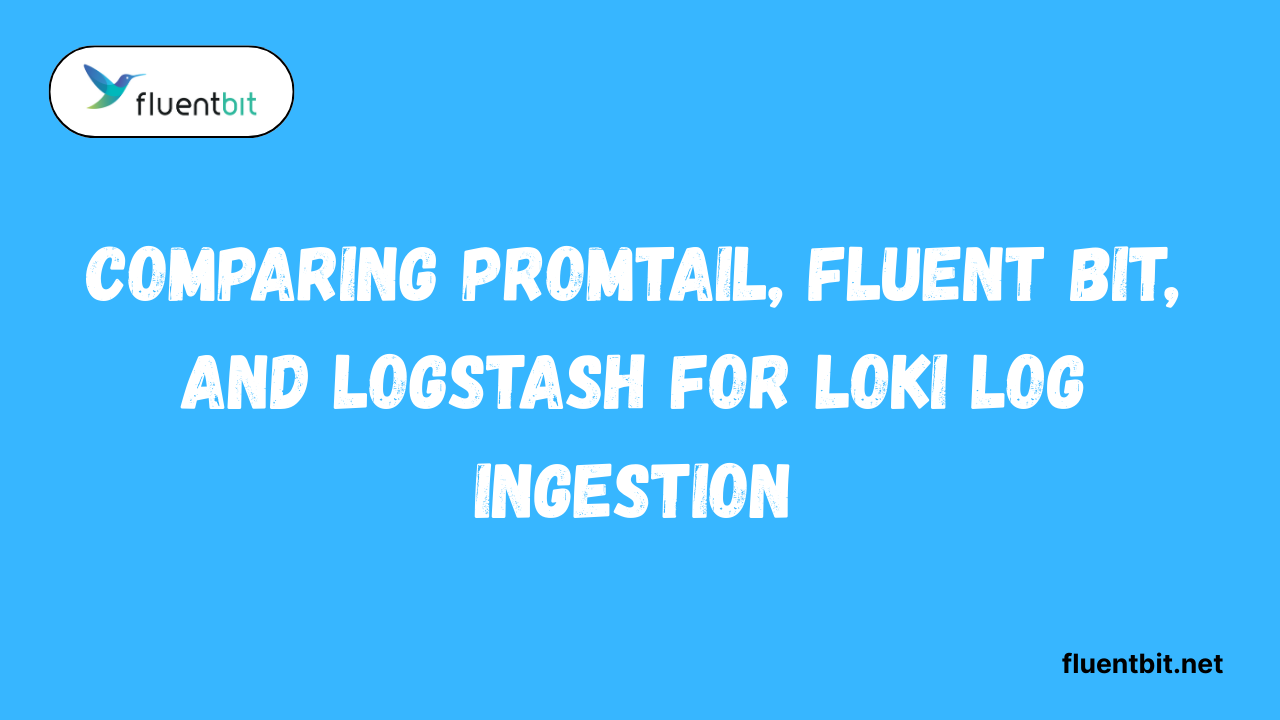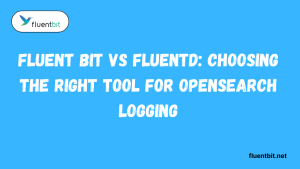Table of Contents
ToggleIntroduction
Logs are like little breadcrumbs left behind by your apps, servers, and containers. Without the right tools to collect and send them, those breadcrumbs turn into a messy trail that’s impossible to follow. Loki log paired with Grafana gives you a beautiful way to explore and visualize logs, but the real magic starts with how you feed logs into it.
What Are Promtail, Fluent Bit, and Logstash?
When it comes to sending logs to Loki, three names consistently appear: Promtail Fluent Bit and Logstash. Each of them acts like a delivery service but they package, label and ship your logs in slightly different ways. Understanding their personality helps you decide which one will be the best fit for your cluster or app.
Overview of Promtail
Promtail is Loki’s best friend. Designed by Grafana Labs, it’s tightly integrated and knows precisely how Loki wants its logs. Think of it as the perfect match: it scrapes logs, attaches labels, and pushes them into Loki without fuss. For teams that want a smooth, Loki-first pipeline, Promtail is often the simplest choice. But the downside? It’s a bit too focused.
Overview of Fluent Bit
Fluent Bit is like the multitasker of log shippers. It can send logs to Loki, as well as to Elasticsearch, Kafka, or even cloud storage. It’s lightweight, fast, and perfect for Kubernetes clusters with high traffic. With its plugin system, you can filter, enrich, and control log flow in ways Promtail doesn’t cover. This flexibility is the reason many folks compare Promtail vs Fluentbit.
Promtail is more Loki-specialized, while Fluent Bit is versatile enough for various setups.
Overview of Logstash
Logstash is the powerhouse of the trio. It has been around for years and is part of the Elastic Stack. It supports a massive range of plugins, making it highly customizable. If you need complex pipelines with data transformations before sending logs to Loki, Logstash can handle it with ease.
The trade-off? It’s heavier and resource-hungry compared to Promtail and Fluent Bit.
Key Features and Differences
When choosing between these tools, it’s not just about shipping logs, it’s about how quickly you can get them running, how much they weigh on your system, and how smoothly they fit with Loki. The debate between Promtail Fluentbit and Logstash often comes down to four key factors: setup performance, Loki integration and ecosystem.
Installation and setup simplicity for Loki Log
Promtail wins on simplicity. Since it’s designed for Loki the setup feels almost effortless. A few YAML changes in Kubernetes and you’re good to go. This is why many beginners or teams running only Loki tend to lean toward Promtail as it just works out of the box.
Fluent Bit on the other hand requires a bit more tweaking but it’s still lightweight and Kubernetes-friendly.
Performance and resource usage
Performance is where Fluent Bit shines. It’s small, efficient and barely impacts CPU or memory usage, making it ideal for high-traffic clusters. Promtail is also light but less optimized for complex pipelines. Logstash, while feature-rich, consumes significantly more resources. In the Fluent Bit vs. Promtail vs.
Integration with Grafana Loki
Promtail is Loki’s native partner so integration is smooth and painless. It labels logs exactly how Loki likes them, making queries easier. Fluent Bit also integrates well with Loki, but requires additional configuration to match labels and metadata. Logstash can also send logs to Loki, but the process is not as seamless.
Ecosystem and plugin availability
This is where Logstash shines brightest. With hundreds of plugins, it can process almost any data format you throw at it. Fluent Bit also has a solid plugin ecosystem supporting filters, parsers, and outputs beyond Loki. Promtail is more focused and has fewer plugins but for Loki-specific tasks, it’s more than enough. If you’re comparing Fluent Bit vs.
Promtail vs Fluent Bit vs Logstash: Which One Should You Choose?
Choosing the right log shipper isn’t about finding the best tool overall it’s about picking the one that matches your environment. The debate between Promtail Fluentbit and Logstash really comes down to use cases. Each shines in a different area so let’s break it down by scenario.
Best for Kubernetes Environments
- Fluent Bit and Promtail integrate seamlessly with Kubernetes clusters.
- Collect logs from pods, containers, and system components efficiently.
- Use labels and annotations to organize and filter logs per namespace or service.
- Support dynamic scaling as pods are created or destroyed.
- Work well with centralized log storage solutions like Grafana Loki.
Best for High-Volume Log Pipelines
- Fluent Bit is lightweight and optimized for processing large log volumes efficiently.
- Supports multi-threading and buffering to handle spikes without dropping logs.
- Promtail can filter and label logs before sending them to reduce unnecessary data.
- Both tools allow scalable deployment in cloud or on-premises environments.
Best for complex log processing needs
Logstash is the heavyweight champion here. With its huge plugin ecosystem, advanced filtering, and transformation capabilities it’s perfect for teams that need to do more than just ship logs. It can reshape, enrich and reformat logs before sending them out.
In contrast, Promtail and Fluent Bit keep things simple. If you don’t need deep processing, either works well, but if your pipeline is complicated Logstash pulls ahead.
Performance Benchmarking
When comparing log collectors, performance is always at the top of the list. In the Promtail vs FluentBit debate FluentBit often shines for its lightweight design and ability to process logs at high speed with minimal overhead.
Throughput and latency comparisons
If your workload generates a high volume of logs per second, Fluentbit vs. Promtail reveals some apparent differences. Fluent Bit can handle larger volumes with lower latency, thanks to its C-based design. Promtail is also fast but it focuses more on reliability and labeling logs for Loki than on raw throughput.
Memory and CPU efficiency
When comparing Fluent Bit and Promtail in terms of resource usage, Fluent Bit is the winner in most cases. Its small memory footprint and efficient CPU handling make it ideal for edge devices and containerized apps. Promtail is also reasonably lightweight, but since it’s specialized for Loki, it uses extra resources for labeling and attaching metadata.
Best Practices for Using Fluent Bit with Loki
One of the simplest ways to improve stability is by adjusting the Fluent Bit buffer size. A larger buffer can handle bursts without dropping logs, while a smaller one reduces memory consumption. The right balance depends on your cluster’s workload. For most setups, testing different sizes will help find that sweet spot. Continuously monitor performance to make sure changes actually improve throughput.
Tuning fluent bit chunk size
The Fluent Bit chunk size controls how data is split before being sent to Loki. If chunks are too small, you’ll see more overhead and slower performance. Too large, and you risk memory pressure during spikes. Fine-tuning this setting is crucial for a smooth log flow.
Please start with the defaults, then adjust them gradually while monitoring your Grafana dashboards.
Handling log bursts and spikes efficiently
In Kubernetes, sudden traffic spikes can overwhelm logging systems. That’s where setting buffer and chunk sizes correctly makes a difference. Pairing fluent bit buffer size with intelligent throttling ensures logs don’t get lost. It’s also smart to add retry logic so data flows even during short outages.
This way, you maintain a resilient logging pipeline without bottlenecks.
Common Challenges and Troubleshooting
When working with Promtail versus Fluentbit or even Fluentbit versus Promtail, one of the first hurdles you might face is connectivity. Sometimes logs simply don’t appear in Loki, and this’s usually due to network issues, incorrect endpoints or misconfigured ports.
Connectivity and permissions issues
A frequent challenge when integrating Fluent Bit with Loki is establishing a connection. These issues typically arise from incorrect service URLs or missing Kubernetes RBAC permissions. Double-checking your ConfigMap often resolves the problem.
When in doubt, logs from Fluent Bit itself will point you to what’s wrong. Always test connectivity after every config change.
Filtering and transforming logs correctly
Fluent Bit allows you to filter and enrich logs before sending them to Loki. But if filters are misconfigured, essential data might be dropped. Always test your filters with sample logs before rolling them out across the cluster. This avoids surprises later. Remember, simple filter rules are easier to maintain.
Managing log consistency across inputs
When collecting logs from multiple pods or nodes, consistency matters. Variations in format can be confused with queries in Grafana Loki. By carefully configuring parsers and labels, you ensure that logs follow a consistent structure. Comparing Fluent Bit and Promtail setups can also help in evaluating results. This step makes analysis faster and dashboards more reliable.
Conclusion
Choosing between Promtail and Fluentbit, or Fluentbit and Promtail, largely depends on your specific needs and environment. Promtail is ideal for Loki-centric setups, while Fluent Bit excels with its flexibility and multi-output support.
Understanding common challenges, like connectivity issues, log spikes, and configuration errors, helps you stay ahead and maintain a reliable logging pipeline.
FAQs
What is the difference between Promtail and Fluent Bit?
Promtail is a lightweight collector built specifically for Grafana Loki. It focuses on scraping logs, adding labels and sending them to Loki in an efficient manner. Fluent Bit on the other hand is more versatile supporting multiple outputs and formats, making it ideal for complex pipelines beyond Loki.
Can Logstash send logs directly to Loki?
Yes, Logstash can send logs to Loki using the appropriate output plugin or HTTP endpoint configuration. However, it is heavier than Promtail or Fluent Bit and may require more resources, especially in Kubernetes environments.
Is Fluent Bit better than Logstash for Kubernetes?
For Kubernetes, Fluent Bit often performs better due to its lightweight nature, native DaemonSet support and efficient memory handling. Logstash is powerful but more resource-intensive which can be a challenge at scale.
How does fluent bit buffer size impact performance?
The Fluent Bit buffer size controls how much log data Fluent Bit holds in memory before sending it to the outputs. A properly tuned buffer size prevents memory overload, reduces log loss, and maintains smooth performance under heavy traffic.
How does fluent bit chunk size affect memory usage?
The Fluent Bit chunk size determines the size of log chunks processed at once. Smaller chunks reduce memory spikes, while larger chunks improve throughput. Balancing chunk size is key for high-performance pipelines.
Can Promtail replace Fluent Bit completely?
Not always. Promtail is optimized for Loki and may lack features required for multi-output setups. Decisions between Fluent Bit and Promtail depend on whether you need flexibility, performance, or simplicity in your logging pipeline.
Which tool is most cost-efficient for production?
Fluent Bit generally wins in cost efficiency due to its lightweight footprint and lower resource usage. Promtail is efficient and straightforward for Loki-only setups while Logstash can be heavier and more expensive at scale.
Latest post:
- Best Practices for Fluent Bit Output Matching in Complex Pipelines
- Setting Up Fluent Bit with Open Telemetry for Unified Observability
- Fluent Bit vs Fluentd: Choosing the Right Tool for OpenSearch Logging
- How to Use fluent-plugin-opensearch for Fluentd Pipelines
- Is Ansys Fluent Better for Complex Fluid Flow Simulations?












